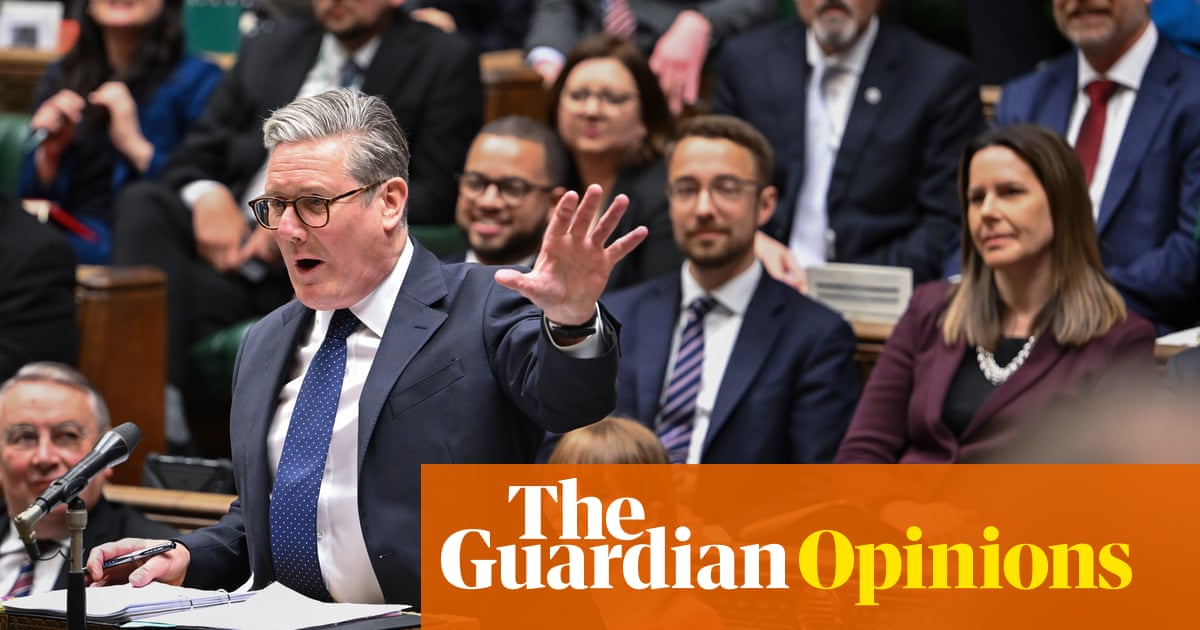You could see this one coming from a long way off. On the day after the International Monetary Fund lowered its growth forecast for the UK by 0.5%. On the day when it was announced that UK government borrowing was £15bn more than expected. On the day when the US wandered out of the latest efforts to end the war in Ukraine.
Yup, you’ve guessed it.Kemi Badenochwasn’t interested in any of this. Yawn. Boring. Who really cares if the economy is in trouble or that the world is in crisis? Instead the leader of the opposition devoted all six of her questions to stoking a culture war. On social media and in the Telegraph, Kemi is a culture-war hero. Her specialist subject? Who should, and who should not, be in possession of a penis in a public toilet.
Kemi had been so desperate to have her say on Tuesday that she had insisted on personally answering Bridget Phillipson’s statement on last week’s supreme court’s ruling on the definition of a woman. You’d have thought Kemi would then have had a chance to say everything she wanted to say. Would have purged her soul and attempted to move on.
But her worldview is shaped by this culture war. Everything is refracted through the prism of biological sex. It’s not enough for her that the supreme court has decided in her favour. She will not rest until her opponents have had their noses ground in the dirt. Winning is not enough. The victory too fleeting. There has to have been some suffering to make the fight worthwhile.
From the off, KemiKaze wasafter an apology from Keir Starmer. She had been right all along and he had been wrong on his previous pronouncements on cervixes and penises. He couldn’t expect to get off the hook that easily. He didn’t get to dig himself out of a hole that easily. There was no Year Zero here. No easy transition to saying the supreme court was right. He had to prostrate himself. Publicly chastise himself for his past wrong thinking.
To be fair, the leader of the opposition wasn’t entirely wrong. Starmer has been on quite the journey on trans rights and his current position is totally at odds with what he was saying a few years ago. From trans rights to gender critical. Though you get the feeling his previous statements in favour of trans rights were more to keep the Labour party sweet.
It would obviously have been a lot easier if Keir had made an apology. Given an interview in which he explained how he had come to change his mind. Politicians love a journey and the public quite like a politician who can admit he got something wrong. And it’s not in the same league as tanking the economy. But Starmer’s psyche won’t allow this. He’d rather look a bit stupid than open to shifting his opinion.
So the exchanges between Keir and Kemi quickly turned into a slanging match. Kemi continuing to pointlessly demand a public retraction and show trial. Starmer just brazening it out with the help of some mild insults. At one point, it felt as if Badenoch might self-combust.
Sign up toFirst Edition
Our morning email breaks down the key stories of the day, telling you what’s happening and why it matters
after newsletter promotion
Kemi was adamant that Starmer should also apologise to Rosie Duffield. The Tory leader takes a far greater interest in independent MPs than she does in her own backbenchers. Rosie scowled theatrically.
This was another apology Starmer was unwilling to make. Instead he turned his attention on Badenoch’s record in government as equalities minister. What had women got to show for her two years in the hot seat? How come she had never bothered to get a supreme court ruling on sex and gender? Keir seemed to think the judgment – grateful as he was for it because it had saved him an awkward row with his own party – was all his own work, rather than one initiated in the Scottish courts.
Starmer went on to list other Tory failures. At the same time as calling forthe heat to be taken out of the situationand for trans rights not to be used as a political football. He had a dig at Robert Jenrick, who had been overheard calling for a coalition between the Tories and Reform. Kemi was already yesterday’s woman. Her party was dying on its feet and she would be lucky to last the year as its leader. It was hard to dismiss this as wishful thinking. Though maybe better left unsaid. Hubris is not a good look.
This was the point when Kemi lost it. “You should be more worried about your own backbenchers than you are about my frontbench,” she declared. Not exactly a vote of confidence in her shadow cabinet. Chris Philp looked taken aback. Not even his party leader took him seriously. Still, at least people knew who he was. More than could be said for some other frontbenchers. Much like the rest of us, some have no idea who they are.
For much of the rest of the session, Duffield bobbed up and down, hoping to catch the Speaker’s attention. Starmer’s answers became longer and more detailed as he tried to delay a public confrontation with one of his fiercest critics. It worked. Lindsay Hoyle bestowed a kindness on the prime minister, having effectively silenced Duffield.
PMQs was over. This culture war had ended in a score draw.
